Related Research Articles

Karl Hermann Johannes Thiele was a German zoologist specialized in malacology. Thiele was born in Goldap, East Prussia. His Handbuch der systematischen Weichtierkunde is a standard work. From 1904 until his retirement in 1925 he was the curator of the malacological collection at the Museum für Naturkunde in Berlin. Thiele described more than 1.500 new species of molluscs; until today their types are deposited with the Museum of Natural History in Berlin. Especially important are his works on the Mollusca of the First German Antarctica Expedition and of the German Deep Sea Expedition aboard the vessel Valdivia.
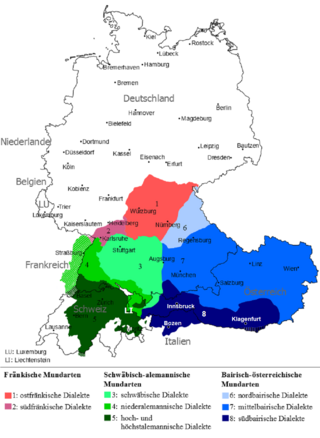
East Franconian or Mainfränkisch, usually referred to as Franconian in German, is a dialect spoken in Franconia, the northern part of the federal state of Bavaria and other areas in Germany around Nuremberg, Bamberg, Coburg, Würzburg, Hof, Bayreuth, Meiningen, Bad Mergentheim, and Crailsheim. The major subgroups are Unterostfränkisch, Oberostfränkisch and Südostfränkisch.

The German Library in Frankfurt am Main (Deutsche Bibliothek abbreviated: DB) was a predecessor of the German National Library (DNB). From 1947 to 1990 it was the West German counterpart to the Deutsche Bücherei in Leipzig, founded in 1912, with the task of collecting German documents and publishing the national bibliography. After the reunification of Germany in 1990, the German Library and the German Library were merged to form "The German Library". Since 2006 it has been called the "German National Library". In 2006, around 8.3 million of the total holdings of the German National Library of 22.2 million units were stored in Frankfurt am Main. At the end of 2011, out of a total of around 27 million media copies, 10 million were archived in Frankfurt.
Karl Johannes Kniep was a German botanist who was a native of Jena.

Christian Ernst Stahl was a Franco-German botanist from Schiltigheim, Alsace. He worked on the ecophysiology of plants and has been considered a pioneer of chemical ecology in his work examining the defences of plants against herbivores, although he considered snails and slugs to be the dominant herbivores that drove plant evolution rather than insects.

August Friedrich Thienemann was a German limnologist, zoologist and ecologist. He studied zoology at the University of Greifswald.
Otto Schrader was a German philologist best known for his work on the history of German and Proto-Indo-European vocabulary dealing with various aspects of material culture, such as the names of domesticated plants and animals, the names of the metals, etc.
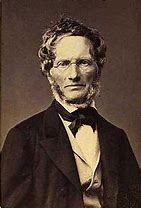
Carl Ferdinand Appun was a German naturalist. On the recommendation of Alexander von Humboldt Appun was employed by Frederick William IV of Prussia as a botanist in Venezuela where excepting a one-year break in Germany, he spent ten years exploring the flora. After that he went to British Guayana, where he researched as a botanist on behalf the British government. He also visited parts of Brazil -the Rio Branco and Rio Negro on the Amazon to Tabatinga. During a visit in Germany (1868–1871) he published a set of essays in different magazines. His best known work Unter den Tropen was at that time extremely popular. In 1871 he undertook a second exploration of Guyana, where he had an accident which led to his death. His last writings were essays about Indigenous peoples in Venezuela. Appun described many new plant species and is also known as an entomologist.
The value judgment controversy (German:Werturteilsstreit) is a Methodenstreit, a quarrel in German sociology and economics, around the question whether the social sciences are a normative obligatory statement in politics and its measures applied in political actions, and whether their measures can be justified scientifically.

Otto Schmeil was a German zoologist, botanist and educator. He is remembered for his reform efforts in regards to biology education; as a zoologist, he specialized in research of copepods and promoted the idea of "living communities" in nature.
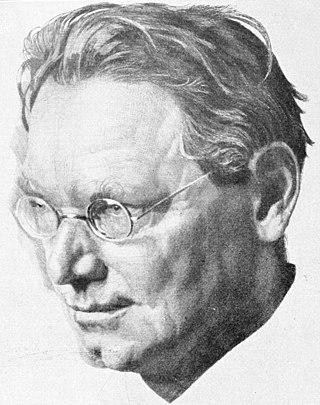
Raoul Heinrich Francé was an Austro-Hungarian botanist, microbiologist as well as a natural and cultural philosopher and popularizer of science. His botanical author abbreviation is "Francé".

Franz Manfred Wuketits was an Austrian biologist, university teacher and epistemologist. He wrote extensively on epistemology, the history and theory of biology, evolution theory, evolutionary ethics, evolutionary epistemology and sociobiology.
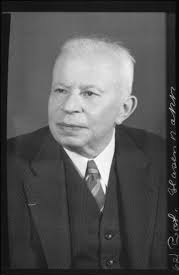
Otto Max Helmuth von Glasenapp was a German indologist and religious scholar who taught as a professor at the University of Konigsberg in East Prussia (1928–1944) and Tübingen (1946–1959).
Hugo Robert Heinrich August Miehe was a German botanist.
Ferdinand Sommer was a German classical and Indo-European philologist.
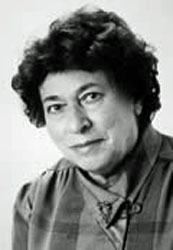
Ingeborg Weber-Kellermann was a German folklorist, anthropologist and ethnologist. She was an academic teacher, from 1946 at the German Academy of Sciences at Berlin in East Berlin and from 1961 at the University of Marburg.

Ferdinand Geminian Wanker was a German Roman Catholic moral theologian.

Fritz Volbach was a German conductor, composer and musicologist.

Friedrich Gustav von der Leyen was a German philologist who specialized in Germanic studies.

Eugen Fehrle was a German philologist who specialized in classical and Germanic philology.
References
- ↑ Andreas W. Daum, Wissenschaftspopularisierung im 19. Jahrhundert: Bürgerliche Kultur, naturwissenschaftliche Bildung und die deutsche Öffentlichkeit, 1848–1914. Munich: Oldenbourg, 1998, pp. 372, 386, 390, 408, 421, 510, including a short biography.
- ↑ Dominick, Raymond H. (1987). "The Nazis and the Nature Conservationists". The Historian. 49 (4): 508–538. ISSN 0018-2370.
- ↑ Ernst Klee: Das Kulturlexikon zum Dritten Reich. Wer war was vor und nach 1945. S. Fischer, Frankfurt am Main 2007, ISBN 978-3-10-039326-5, S. 542.